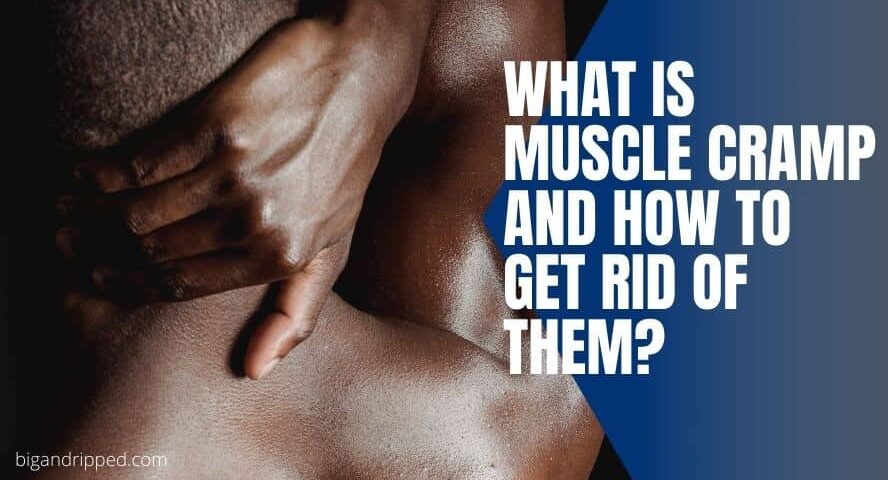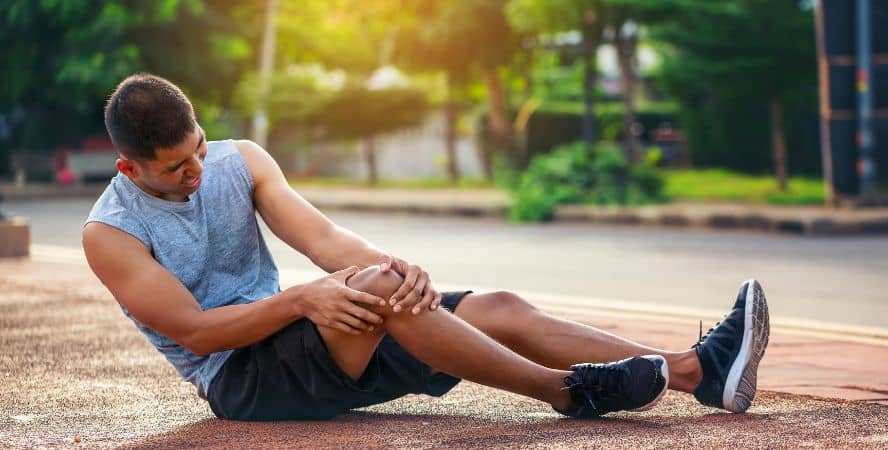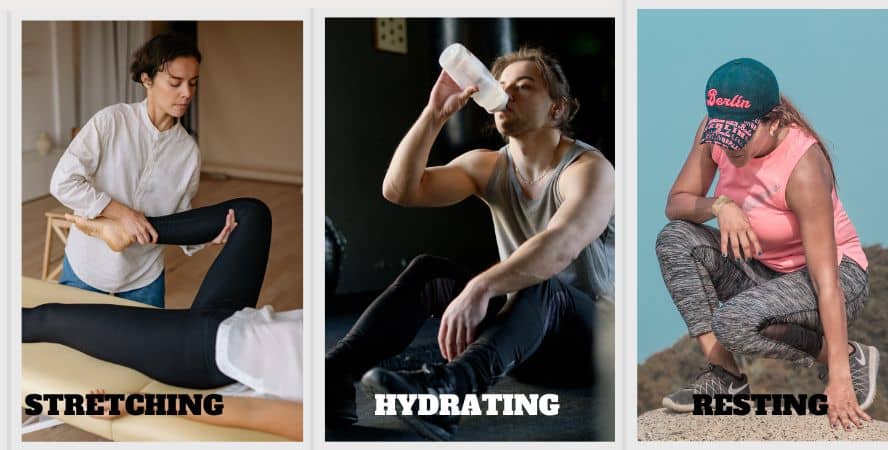- Have any questions?
- hello@bigandripped.com
What Muscle Cramps Feel Like and How to Stop it Immediately?

Muscle Cramps are always a surprise, but not at all the pleasing ones!
Table of Contents
- 1 Muscle Cramps are always a surprise, but not at all the pleasing ones!
- 2 What is Muscle Cramp and How Does It Feel Like?
- 3 Muscle Cramps Symptoms
- 4 Muscle Cramps Causes
- 5 Risk Factors for Muscle Cramps
- 6 What Causes Severe Muscle Cramps at Night?
- 7 How to Get Rid of Muscle Cramps Instantly?
- 8 Things to Avoid When You Have Muscle Cramps
- 9 How to Prevent Muscle Cramps?
- 10 When to See The Doctor for Muscle Cramp?
- 11 Concluding Thoughts
We all have experienced muscle cramps at least once.
So, are muscle cramps good? Not really, in terms of experience.
Muscle cramps are extremely uncomfortable and painful as well Notably, muscle cramps can be mild or worse; additionally, they can happen at night as well.
So, if they are so bad, what should you do? How to stop muscle cramps?
Well, there are numerous ways that can help you with relieving muscle cramps all over your body.
Moreover, muscle cramps are mostly harmless. Nonetheless, they are not something to casually brush off.
Here’s is all about what is muscle cramp and how to get rid of them. Let’s get started.
What is Muscle Cramp and How Does It Feel Like?

As we move, the voluntary muscles contract and relax.
They contract and relax in synchronization. This help maintains the posture and also helps with smooth movement.
An involuntary contraction in the muscle that occurs suddenly in one or more of your muscles and fails to relax is what a muscle cramp is.
To explain, when a muscle contracts involuntarily it’s said to be a spasm.
However, when the spasm sustains and feels forceful, it’s recognized as a cramp.
Given that, where do you get muscle cramps?
Muscles that can be voluntarily controlled can cramp.
Leg cramps, foot cramps, and thigh and calf cramps are some of the common muscle cramps.
Furthermore, involuntary muscles for instance heart, kidney, and lungs can also witness cramps (but we’ll not be dealing with them in this article).
Muscle cramps after a workout are a fairly common occurrence that causes visible hardening of the cramped muscles.
So, how long do muscle cramps last?
This involuntary contraction arrives without a warning and lasts somewhere from a few seconds to several minutes.
Sometimes muscle cramps can last for a couple of hours and occasionally longer.
If so, what do muscle cramps feel like?
Muscle cramps are often painful and uncomfortable. With this in mind, let’s see what the symptoms of muscle cramps are.
Muscle Cramps Symptoms
Some of the symptoms of muscle cramps that one can experience are:
- Sudden pain
- Tightness in muscles
- Temporary hard lump under the skin
- Twitching under skin
- Disturbed functioning of the affected limb
Depending on the affected muscles, normal movement of the body part may be problematic.
For instance, in case of leg muscle cramps, it might get painful and difficult for you to walk.
Likewise, in case of shoulder muscle cramps, you might not be able to write properly.
And, in case of neck muscle cramps, it gets difficult to move your head around.
Sounds painful!
So, what causes muscle cramps, and how to get rid of them?
Interestingly, there is more than one answer to what causes muscle cramps all over the body.
Muscle Cramps Causes
Sometimes there are no obvious reasons for the occurrence of muscle cramps.
A muscle cramp is a chaotic and spontaneous contraction in your muscles.It happens when overly excited muscles that control the muscles backfire.
Your body moves throughout the day.
The motor nerves are extremely sensitive and sometimes trigger the spasm; which when sustains leads to muscle contractions.
That’s how muscle cramps occur.
Now, what leads to the triggering of such muscles could also vary.
It could be anything from normal causes, to medication, to certain illnesses.
Common Causes Of Muscle Cramps
Some of the common causes of muscle cramps are as follows:
- Standing for a longer duration
- Dehydration
- Lack of blood circulation in muscles
- Initiating a new exercise
- Excess of workout
- Inactivity
- Aging
- Inadequate Diet
Apart from common causes, there are medical reasons behind cramps as well.
Medical Causes of Muscle Cramps
The medical causes of muscle cramps are:
- Consuming certain medications like diuretics, asthma drugs, and medications for cholesterol to name a few.
- Pregnancy
- Deficiency of certain vitamins
- Lack of electrolytes for instance magnesium and potassium
- Spinal injury or problems in the neck and back
- Dialysis
- Atherosclerosis (Condition that leads to narrowed arteries)
- Sciatica
Bet you didn’t know there could be so many answers to what would cause muscle cramps.
Adding to it, certain risk factors increase the chances of getting a muscle cramp.
Risk Factors for Muscle Cramps
There are certain factors that trigger the causes or add to the pain of muscle cramps. Some of them are as follows:
- Wearing high heels for longer
- Poor body posture
- Exercising in heat
- Stress
- Lack of stretching
- Lack of warm-up before the workout
- Carrying heavy things
Moving on, although, muscle cramps can happen to anyone, certain people are at higher risk of getting them.
So, who is at risk?
Muscle cramps are more common among the following people:
- Pregnant woman
- Elderly people
- Athletes
- Workout enthusiasts
- Overweight people
- People with medical conditions like nerve disorder
These people need to take extra care while performing any exercise or making sudden movements.
Muscle cramps are usually for a shorter period. However, this doesn’t stop them from giving rise to sudden panic and anxiety.
Especially the occurrence of muscle cramps when sleeping.
What Causes Severe Muscle Cramps at Night?
This creates an instant urge to say ‘Been there, done that.
Around 60% of the adults report having had night muscle cramps.
Leg cramps or Charley horses are among the most common nocturnal muscle cramps.
Notably, around 50-60% of adults and 7% of children report nocturnal leg cramps.But what causes leg muscle cramps at night and how to stop them?
Well, the exact reason is still unknown.
Still, depending on the experiences of numerous people, it can be divided into 3 parts.
- Increasing age– With increasing age frequent backfiring of motor nerves becomes common. As a result, there are muscle cramps even at night.
- Exercise– Exercise-induced muscle cramps could be because of a lack of electrolytes, or exercising after a long time.
- Medical issues like vascular disease, restless legs syndrome, cirrhosis, and pregnancy.
Some of the time nocturnal leg cramps could be so painful that it results in sleepless nights.
It gets so bothersome; that patients need to seek medical help.
With this intention, let’s get to know how to stop leg cramps fast.
How to Get Rid of Muscle Cramps Instantly?

Some of the muscle cramps get treated on their own. However, some continue to bother you for longer.
In such a case, you can try some ways to treat muscle cramps.
#1. Common Ways to Relief Muscle Cramps
Some of the common ways to get rid of muscle cramps are:
Pause for a While
The first and best thing to do just when you think your muscles backfired is to stop.
Address the cramped muscle and avoid moving it for a while until you get a hold of the situation.
Do a Little Stretch
If you are looking for how to stop leg cramps immediately, this might be the one.
If you cramped your leg muscles somewhere around the calf, carefully do some stretching to provide relief to the muscles.
In the case of cramped back muscles as well, you can try some of the best stretching exercises.
Use Hot Water Bags
Using hot water bags also answers how to stop muscle cramps fast. Hot water bags of hot pads helps relax the muscles and loosens the tension and stiffness of the muscles.
Massage Might Help
Massaging the stretched or cramped muscles provides instant results.
Knead the cramped muscle gently to relax. Perform some light massage until the cramp subsides.
Nonetheless, if you are unaware of any massage take help of physiotherapists.
Refill your Fluids
If your muscle cramps are because of dehydration, try refilling your body with electrolytes that help get relief from muscle cramps.
Magnesium and potassium are found to be effective in reducing muscle cramps.
You might be wondering how potassium reduces muscle cramps.
Well, potassium starts and even stops muscle cramps.
A lack of an adequate amount of potassium can lead to severe muscle cramps.
These were some of the most commonly adopted ways to reduce muscle cramps.
However, apart from these, some natural solutions can tell you how to stop muscle cramps immediately.
#2. Natural Solutions To Stop Muscle Cramps
There is nothing that nature can’t treat; even your muscle cramps.
Here are some of the natural solutions to get your cramped muscles treated.
Apple Cider Vinegar
Interestingly, some athletes find solutions for their muscle cramps in apple cider vinegar.
What’s more interesting is, that it’s rich in potassium.
Adding to it, apple cider vinegar is also one of the proven home remedies to treat leg muscle cramps.
All you have to do is take 2 teaspoons of vinegar in a dab of honey, mix it and drink it. That’s it!
Acupressure
Acupressure is another natural and effective way to treat muscle cramps.
It is at times even recommended by healthcare professionals.
Not only is it effective but also inexpensive and easy to perform.
However, it is to be noted, that if you are performing it for the first time, take the help of a professional.
Foods for Muscle Cramps
You can also try eating foods to reduce muscle cramps.
Some of the best foods for muscle cramps are bananas, dried foods, pesto, beetroot, celery, sardines, yogurt, and chocolate.
Moving on, apart from the above 2 ways, you can also do one more thing to reduce muscle cramping.
So, what is it?
Things to Avoid When You Have Muscle Cramps
Yes, you read that right!
Sometimes not doing certain things could also be the solution to your existing pain.
Such is the situation in the case of muscle cramps as well.
If you have muscle cramps, you must avoid performing certain things.
- Avoid increasing the intensity and number of exercises until your muscle cramp is gone.
- Restrict yourself from performing any kind of strength exercises.
- It creates pressure on the muscles and may lead to further damage.
- Avoid complete rest. Continue to do some kind of exercise to keep the muscles moving.
- Avoid putting pressure on the cramped muscles purposely.
Also, try not to treat it by forcing it to come to its natural state.
Doing this can only increase the severity.
This was all about how to relieve muscle cramps.
Now knowing what is muscle cramp and how to get rid of them is all good.
But what if you want to prevent muscle cramps in the first place?
Is it possible?
Of course, yes!
But there is a catch.
Muscle cramps appear suddenly and while there are ways to prevent muscle cramps, there is no 100% guarantee.
However, we all know prevention is better than cure.
How to Prevent Muscle Cramps?
You can easily prevent muscle cramps by incorporating some healthy lifestyle choices.
#1. Drink plenty of Water
Are muscle cramps a sign of dehydration?
Yes, and keeping yourself hydrated is one of the best solutions to prevent muscle cramping.
If you are into workouts and often witness muscle cramps, try drinking at least 2 cups of water before and after your workout.
Proper hydration is of utmost importance to connective tissues and muscles.
Also, it helps with proper oxygen supply to muscles. This as result, helps prevent the cramping of muscles.
#2. Don’t Forget to Stretch
You might hear this again and again.
There are chances you must have heard about stretching benefits from your gym coach and professional athletes.
Always try not to slip by doing enough stretching before the warm-up. It helps get your muscles ready for what’s coming next.
Moreover, you can also try some stretching before going to bed to prevent nocturnal leg cramps.
Related: Benefits of Dynamic Stretching
#3. Take Care of Your Diet
Sometimes, vitamin and mineral deficiency can also result in muscle cramps.
Hence, taking care of your diet and fulfilling the needs of your body can help prevent muscle cramps in the first place.
So, what deficiency causes muscle cramps?
The deficiency of magnesium, potassium, sodium, and calcium can lead to muscle cramps.Therefore, it’s vital to fill your plates with foods rich in calcium, magnesium, potassium, and sodium.
#4. Learn to Relax
Exercising, working out, and taking care of your body are all great.
But sometimes your body demands rest.
Your body can only take as much as it can and reciprocate the results.
Providing unnecessary and extra pressure on the small muscles can only lead to damage and pain.
One such pain is muscle cramps.
Also, if you are training to build muscles, learn to take one step at a time.
You can increase the intensity of your training gradually to muscle cramps.
#5. Strengthen Your Ankles and Feet
If you have weak ankles and feet, you are more likely to experience muscle cramps.
Weak feet and ankles shift most of the load on your calves as a result of muscle cramps.
Muscles are naturally interconnected. Hence it requires strengthening of every muscle to avoid shifting of load leading to cramps.
You can try ankle and foot exercises and running and cycling to improve the strength of your ankles and feet.
Making these changes in your lifestyle and eating habits can surely keep muscle cramps at bay to an extent.
Notably, there are times when people need to reach the doctor to avoid any further damage even in the case of muscle cramps.
So…
When to See The Doctor for Muscle Cramp?
Although muscle cramps often get vanished in a few minutes, there is no surety to that.
In certain situations, you need to rush to the healthcare provider before trying any further home remedies for muscle cramps.
Some of the situations when you should consult your doctor are:
- When muscle cramps start to occur frequently.
- When the pain continues to stay for longer and is unbearable.
- If the color of the skin of the cramped muscles changes.
- If there is swelling and numbness in the cramped area.
- If it doesn’t get better with stretching and fluid consumption.
Muscle cramps are uncontrollable sudden pain in the muscles.
And while it is mostly harmless, it can at times make the situation worse if ignored for a long.
Concluding Thoughts
Muscle cramps are absolutely normal if you are an athlete, an elderly person, or someone who likes to be a couch potato all day.
However, what’s not normal is its frequent happening and persisting pain.
This painful contraction of muscles could either be the result of excessive exercise or could be the sign of something worrisome.
No matter what causes muscle cramps, what’s important is to get rid of them as soon as you can.
Or else you might have to spend your night in pain sleeplessly.
Don’t let the muscle cramps get the best of you!
Learn how to reduce muscle cramps and defeat them in their own battle. Or Even better prevent it in the first place.
If you liked the blog, share it with your friends who often complain of muscle cramps.

